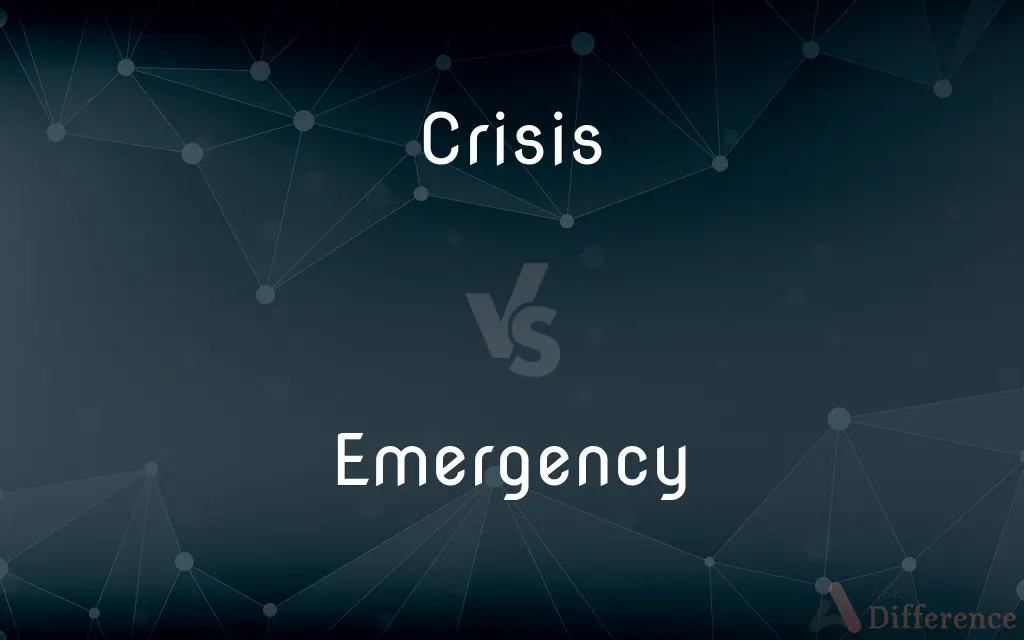Crisis vs. Emergency — What's the Difference?
By Maham Liaqat & Urooj Arif — Updated on March 20, 2024
A crisis is a complex situation demanding significant resources and time to manage, often with widespread impact. An emergency is a sudden, urgent event requiring immediate action, typically localized.

Difference Between Crisis and Emergency
Table of Contents
ADVERTISEMENT
Key Differences
A crisis involves a situation that threatens long-term stability, security, or functionality on a broad scale, demanding a strategic, multifaceted response. An emergency, in contrast, refers to an immediate, acute situation that poses an immediate risk to health, life, property, or environment.
While both terms imply situations of significant stress and potential harm, the scope and duration distinguish them. Crises are often characterized by their prolonged nature and potential for widespread impact, necessitating complex solutions and management strategies. Emergencies, however, are more about immediate threats and the need for quick, decisive action to mitigate those threats.
The response mechanisms for a crisis versus an emergency also differ. Crisis management often involves long-term strategies, including risk management, communication plans, and recovery efforts that may span years. Emergency response, conversely, focuses on immediate action, such as evacuation, first aid, and emergency services, to address the direct impacts of the situation.
Understanding the difference between a crisis and an emergency is crucial for effective management and response. Proper identification helps in mobilizing the appropriate resources, strategies, and responses necessary to address the situation at hand, whether it requires immediate action or a sustained, strategic approach.
Comparison Chart
Nature
Complex, long-term impact
Sudden, urgent, immediate risk
ADVERTISEMENT
Scope
Broad, can be global
Localized, affecting specific areas or groups
Response Time
Strategic, can be prolonged
Immediate action required
Management
Involves long-term planning and recovery
Focuses on quick, decisive responses to mitigate
Examples
Financial crisis, climate change
Natural disasters, medical incidents
Compare with Definitions
Crisis
Impacts can be widespread, affecting various aspects of society.
The housing crisis affected millions, leading to calls for major policy reforms.
Emergency
A sudden, urgent situation needing immediate response to prevent harm.
Emergency services were called to the scene of the accident.
Crisis
A complex situation threatening significant harm over a long term, requiring strategic response.
The global financial crisis demanded unprecedented international cooperation.
Emergency
Aimed at addressing direct impacts quickly.
Emergency medical teams provide lifesaving care at accident sites.
Crisis
Focuses on managing and mitigating long-term risks.
The company developed a crisis management plan to handle future cybersecurity threats.
Emergency
Involves deploying resources like emergency services and aid.
The city opened emergency shelters for displaced residents.
Crisis
Requires multifaceted solutions and coordination.
Addressing the opioid crisis involves healthcare, law enforcement, and community support.
Emergency
Typically localized, affecting specific individuals or communities.
The flood emergency prompted local evacuations.
Crisis
Often evolves, allowing for planning and adjustments.
The climate crisis has prompted worldwide debates on long-term environmental strategies.
Emergency
Requires rapid, immediate actions like evacuation or first aid.
In case of fire, follow the emergency evacuation plan.
Crisis
A crisis (plural: "crises"; adjectival form: "critical") is any event or period that will lead, or may lead, to an unstable and dangerous situation affecting an individual, group, or all of society. Crises are negative changes in the human or environmental affairs, especially when they occur abruptly, with little or no warning.
Emergency
A brake operated by hand; usually operates by mechanical linkage
Crisis
A time of intense difficulty or danger
The monarchy was in crisis
The current economic crisis
Emergency
An emergency is a situation that poses an immediate risk to health, life, property, or environment. Most emergencies require urgent intervention to prevent a worsening of the situation, although in some situations, mitigation may not be possible and agencies may only be able to offer palliative care for the aftermath.
Crisis
A crucial or decisive point or situation, especially a difficult or unstable situation involving an impending change.
Emergency
A serious situation or occurrence that happens unexpectedly and demands immediate action.
Crisis
A sudden change in the course of a disease or fever, toward either improvement or deterioration.
Emergency
A condition of urgent need for action or assistance
A state of emergency.
Crisis
An emotionally stressful event or traumatic change in a person's life.
Emergency
For use during emergencies
Emergency food rations.
Crisis
A point in a story or drama when a conflict reaches its highest tension and must be resolved.
Emergency
A situation which poses an immediate risk and which requires urgent attention.
Cardiac arrest is an emergency and if you find someone in cardiac arrest you should call 999 immediately.
Crisis
A crucial or decisive point or situation; a turning point.
Emergency
The department of a hospital that treats emergencies.
Crisis
An unstable situation, in political, social, economic or military affairs, especially one involving an impending abrupt change.
Emergency
An individual brought in at short notice to replace a member of staff, a player in a sporting team, etc.
Crisis
(medicine) A sudden change in the course of a disease, usually at which point the patient is expected to either recover or die.
Emergency
Arising from or used in an emergency.
Crisis
(psychology) A traumatic or stressful change in a person's life.
I'm having a major crisis trying to wallpaper the living room.
Emergency
(archaic) The quality of being emergent; sudden or unexpected appearance; an unforeseen occurrence.
Crisis
(drama) A point in a drama at which a conflict reaches a peak before being resolved.
Emergency
Sudden or unexpected appearance; an unforeseen occurrence; a sudden occasion.
Most our rarities have been found out by casual emergency.
Crisis
The point of time when it is to be decided whether any affair or course of action must go on, or be modified or terminate; the decisive moment; the turning point.
This hour's the very crisis of your fate.
The very times of crisis for the fate of the country.
Emergency
An unforeseen occurrence or combination of circumstances which calls for immediate action or remedy; pressing necessity; exigency.
To whom she might her doubts propose,On all emergencies that rose.
A safe counselor in most difficult emergencies.
Crisis
An unstable situation of extreme danger or difficulty;
They went bankrupt during the economic crisis
Emergency
A sudden unforeseen crisis (usually involving danger) that requires immediate action;
He never knew what to do in an emergency
Crisis
A crucial stage or turning point in the course of something;
After the crisis the patient either dies or gets better
Emergency
A state in which martial law applies;
The governor declared a state of emergency
Common Curiosities
What defines a crisis?
A crisis is defined by its complexity, potential for long-term impact, and the need for strategic, coordinated responses.
What is crisis management?
Crisis management involves strategies and actions aimed at addressing and mitigating the effects of a crisis over the long term.
How are emergencies declared?
Emergencies are often declared by governmental authorities or organizations in response to immediate threats to health, safety, or the environment.
Who responds to crises and emergencies?
While emergency services (fire, police, medical) primarily handle emergencies, crises require a coordinated effort from governments, organizations, and sometimes international bodies.
What is considered an emergency?
An emergency is a sudden, urgent situation that poses immediate risks and requires quick action to mitigate.
What is the role of planning in crisis management?
Planning is crucial in crisis management to identify potential risks, develop response strategies, and ensure resources are available for long-term recovery.
How does the scope of a crisis differ from an emergency?
A crisis can have a broad, potentially global scope, affecting various societal sectors, whereas an emergency is more localized.
Can an emergency turn into a crisis?
Yes, if an emergency situation is not managed effectively, it can escalate into a crisis with more complex and long-lasting implications.
Why is quick response crucial in an emergency?
Quick response is vital to prevent further harm, protect lives, and stabilize the situation as rapidly as possible.
How do organizations prepare for crises and emergencies?
Organizations prepare through training, drills, emergency plans, and crisis management protocols to ensure readiness and effective response.
Can technology help in managing crises and emergencies?
Yes, technology plays a crucial role in early warning systems, communication, and coordinating responses in both crises and emergencies.
What is the first step in responding to an emergency?
The first step is often to assess the situation quickly and activate emergency response protocols to ensure the safety and protection of affected individuals.
What tools are used in managing a crisis?
Crisis management tools include risk assessments, communication plans, and recovery strategies to address the complex nature of crises.
What is an example of a crisis that turned into an emergency?
A health crisis, like a pandemic, can lead to emergencies if outbreaks occur that require immediate public health interventions.
What impact do crises and emergencies have on communities?
They can have significant psychological, economic, and social impacts, disrupting lives and necessitating substantial recovery efforts.
Share Your Discovery

Previous Comparison
Distinctness vs. Distinctiveness
Next Comparison
Era vs. AgeAuthor Spotlight
Written by
Maham LiaqatCo-written by
Urooj ArifUrooj is a skilled content writer at Ask Difference, known for her exceptional ability to simplify complex topics into engaging and informative content. With a passion for research and a flair for clear, concise writing, she consistently delivers articles that resonate with our diverse audience.












































